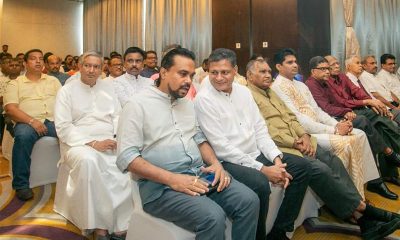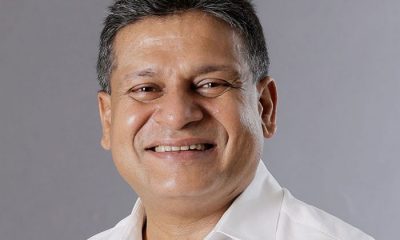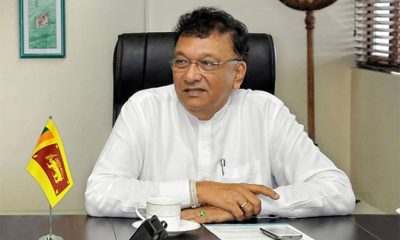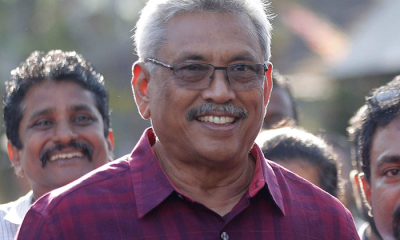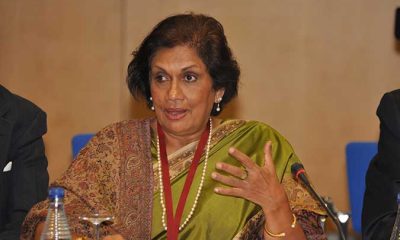Midweek Review
GR’s exit and developing crisis: Different interpretations
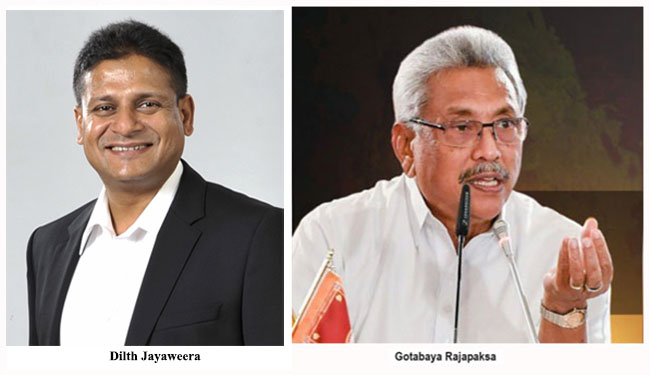
By Shamindra Ferdinando
President’s Counsel Manohara de Silva recently questioned the failure on the part of the cash-strapped Ceylon Electricity Board (CEB) to provide electricity, without interruption, at least during the GCE Advanced Level examination.
The outspoken lawyer raised the issue with the writer, on January 23, the day the delayed examination began at 2,200 centres, with 331,709 students sitting the examination, countrywide. It was, originally, to commence on Dec. 05, 2022.
The constitutional expert pointed out how even in the implementation of daily power cuts, the CEB, obviously, discriminated against the population, at the behest of the political leadership, by excluding selected areas from, what he called, the daily scourge of living without electricity. Pointing out the responsibility of the media to take a strong stand on this issue, the President’s Counsel said that certain areas, categorized as ‘VIP,’ received a 24-hour, uninterrupted, power supply.
The CEB resorted to daily power cuts, last year, after a long time, during President Gotabaya Rajapaksa’s time, as the economic crisis gripped the country, with the government unable to pay for the import of even basic needs, like gas, fuel, medicines, etc. At one time, there were 10- to 12-hour power cuts. The then Power and Energy Minister, Udaya Gammanpila, is on record as having said that President Gotabaya Rajapaksa ignored his plea for immediate small power cuts, to conserve what we had, at the beginning of the total breakdown, in January 2022, to lessen the full impact of the developing crisis hitting us at once down the road. Attorney-at-law Gammanpila pointed out that the President’s failure finally led to 12-13 hour power cuts, leading to the explosion of public anger, in the last week of March, 2022.
The continuing power crisis reflected the overall waste, corruption, irregularities, mismanagement, at every level, not only at the CEB, but the entire public sector, as well, over the past several decades.
The intervention made by the Human Rights Commission (HRCSL) last Wednesday (25) to compel the CEB to ensure uninterrupted power supply, failed.
In spite of Commissioner, Dr. M.H. Nimal Karunasiri, of the HRCSL, on its behalf, proudly claiming that it had secured a consensus with all stakeholders to suspend power cuts, ignoring all that, the CEB went ahead with the routine electricity supply interruptions.
The power crisis, coupled with an explosive cocktail of issues caused by Sri Lanka’s failure to meet its international loan commitments, contributed to the further deterioration of the country’s economy. The crisis affected Sri Lanka in the first quarter of 2021, with the Easter Sunday carnage, and the pandemic, already having done much damage, especially to the vital tourism sector, among others, but President Rajapaksa’s government ignored the threat.
Appearing in a live programme, telecast simultaneously, both on stateowned and private television networks, the Governor of the Central Bank, Dr. Nandalal Weerasinghe, recently alleged the then government hid Sri Lanka’s bankruptcy status before its inability to service foreign debt was officially acknowledged in early April last year. Having accepted the hot seat, in early April, last year, Dr. Weerasinghe announced suspension of repayment of loans, temporarily. In spite of progress made, the IMF USD 2.9 bn extended loan facility remained yet to be implemented.
What really caused the economic meltdown? Could President Gotabaya Rajapaksa averted public humiliation if he sought IMF’s intervention in early 2020? Who prevented Gotabaya Rajapaksa from doing so, as Sri Lanka had knelt before the IMF on 16 previous occasions? His elder brother, Mahinda Rajapaksa, who held the Finance portfolio, could have advised the President. Didn’t Premier Mahinda Rajapaksa advise his brother in this regard? And what was the role played by former Treasury Secretary, Dr. P.B. Jayasundera, not just another run-of-the-mill economist. Having been seconded to the Treasury, from the Central Bank, from the time Ronnie de Mel was the Finance Minister, his exceptional talents were tapped by the Finance Ministry, even under President Premadasa, when R. Paskaralingam, of the Pandora Papers’ notoriety, was the Treasury Secretary. And he continued to serve the Treasury, under successive Presidents, thereafter, especially in the hot seat, as the Finance Ministry Secretary, in one of the most difficult periods in the country’s history, during the final phase of the conflict, when it was a fight to a finish with the LTTE, especially after President Mahinda Rajapaksa telling the then British Foreign Secretary, David Milliband, and his French counterpart, Bernard Couchner, to get lost when they went all the way down to Embilipitiya to tell Mahinda to stop the war to enable them to rescue Velupillai Prabhakaran, and what was left of his terrorist movement, by a flotilla of vessels they were ready to dispatch to the coast of Mullaitivu. PBJ, no doubt, ensured that no expense was spared when waging the most costly war of attrition, while keeping the economy humming with massive infrastructure projects, like building expressways, Hambantota Port, Mattala International Airport, etc. So it is quite puzzling why PBJ failed to guide President Gotabaya Rajapaksa on the path of correct economic decisions. Surely it can’t be due to him past the retirement age.
After being Secretary to President Gotabaya Rajapaksa, during this turbulent period, Dr. PBJ was asked to go in Dec. 2021, when the former’s presidency had suffered irrevocable damage.
Leaving all the above aside, it must be stated here that whatever disagreements, or misunderstandings we may have had in the past, with New Delhi and Beijing, we should be eternally grateful to both India and China for being unwaveringly behind us in that most difficult final phase of the war.
Ex-CP Chief D.E.W. Gunasekera recently discussed the downfall of President Gotabaya Rajapaksa, after having polled a staggering 6.9 mn votes at the last presidential election, in Nov 2019. President Rajapaksa resigned on July 14, 2022, in the wake of snowballing violent protests that began on March 31, outside his private residence, at Pangiriwatta, Mirihana.
In a brief but fiery speech, the former Marxist minister explained how the wartime Defence Secretary caused the rapid deterioration of his government for want of a sound economic strategy. The retired public servant, who served as a lawmaker (2004-2015), found fault with President Rajapaksa for the ongoing political-economic-social crisis.
The veteran politician recalled how he suggested to the then Premier Mahinda Rajapaksa to advice brother Gotabaya to seek Chinese assistance to overcome the impending financial crisis. The outspoken politician blamed it all on the economic reasons.
Gunasekera said so at the opening of Eastern School of Political Studies, at the newly renovated CP party office, at Dr. N.M. Perera Mawatha, Borella, with the participation of Chinese International Department Vice Minister, Chen Zhou, and Acting Chinese Ambassador, Hu Wei.
Declaring that he himself warned President Gotabaya Rajapaksa of the impending crisis and provided a recovery plan in the run up to the last presidential election, held on Nov. 16, 2019, Gunasekera accused the fallen President of turning a blind eye.
The ex-minister placed the blame squarely on President Gotabaya Rajapaksa.
A different interpretation
Derana Chief, Dilith Jayaweera, at one time, one of the closest associates of ousted President Gotabaya Rajapaksa, in a YouTube interview with Eraj Weeraratne, discussed political developments, since 2018, leading to a violent public protest movement that forced Gotabaya Rajapaksa out of office. Jayaweera, who is also the Chairperson of the George Steuart Group, as well as George Steuart Finance Limited, squarely blamed the Rajapaksa family, including Gotabaya, for the turbulent end to his rule.
Responding to a Weeraratne’s query, Jayaweera, declared lawmaker Namal Rajapaksa had no political future. The outspoken entrepreneur was unhesitant. Asserting twice President Mahinda Rajapaksa’s son, Namal, currently a member of Parliament, representing one-time Rajapaksa bastion, the Hambantota district, has lost his bearings, Jayaweera questioned the young politician’s sincerity.
Jayaweera didn’t mince his words when he declared that having failed to deprive Gotabaya Rajapaksa of an opportunity to contest the 2019 Presidential Election, the one-time first family worked overtime to undermine his authority at every level. The first family went to the extent of supporting the ‘GotaGoHome’ campaign that compelled the President to give up power, without a fight.
Jayaweera attributed to Mahinda Rajapaksa’s second son, Yoshitha (formerly of the Navy) with #GotaGoHome# hashtag that became the clarion call of the high profile protest campaign to oust the previous President.
That tagline doesn’t belong to Aragalaya, Jayaweera declared, alleging that it grew out of the former first family’s inability to stomach Gotabaya Rajapaksa exercising executive power.
The controversial political strategist revealed the ex-first family’s angry reaction to his close relationship with President Gotabaya Rajapaksa. “They believed I was trying to move the President out of the family’s orbit. But, the people wanted a Rajapaksa who didn’t represent the interests of the family.” Jayaweera said.
The intrepid local entrepreneur is convinced President Gotabaya Rajapaksa couldn’t overcome the combined challenge posed by the Rajapaksa family.
Responding to another rapid-fire question, Jayaweera explained how the Rajapkasa family thwarted President Rajapaksa’s move to appoint senior public servant, Anura Dissanayake, as his Secretary. But, the Rajapaksa family forced their loyalist Gamini Senarath, who had been Prime Minister Mahinda Rajapaksa’s Secretary, on President Gotabaya Rajapaksa, following the exit of PBJ, Jayaweera claimed. According to him, that was definitely the worst example of the Rajapaksa’s family’s interference that rapidly weakened Gotabaya Rajapaksa’s presidency.
The appointment of Dr. Jayasundera, as President Gotabaya Rajapaksa’s Secretary, should be examined against the backdrop of Jayaweera’s disclosure that Gotabaya Rajapaksa hadn’t been so critical of any other individual during private conversations he had with him.
Cardinal sin
President Gotabaya Rajapaksa’s cardinal sin was nothing but the enactment of the 20th Amendment to the Constitution, Jayaweera declared. That controversial piece of legislature created an extremely hostile political environment and gradually weakened President Gotabaya Rajapaksa’s authority, Jayaweera said, recalling how Basil Rajapaksa forced his way into Parliament, on the SLPP National List, regardless of political consequences.
Jayaweera said that he received an assurance from President Gotabaya Rajapaksa, in the presence of SLPP National List MP, Gevindu Cumaratunga, that enactment of the 20th Amendment at the expense of the 19th A was not meant for Basil Rajapaksa’s re-entry into Parliament. “President Gotabaya Rajapaksa didn’t keep his promise. Therefore, he should be accountable for the subsequent developments which preceded the demise of his political authority.”
Jayaweera explained how the Rajapaksas interpreted Gotabaya Rajapaksa’s victory at the 2019 presidential poll for their advantage. “The family asserted that Gotabaya Rajapaksa received a staggering 6.9 mn votes due to Mahinda Rajapaksa’s popularity. So, the family asserted that the new President should pursue their agenda. The family appointed Dr. Jayasundera as the Presidential Secretary.
Basil Rajapaksa believed he should be able to control Parliament. Basil Rajapaksa justified his overall political authority on the basis his SLPP secured a near 2/3 majority in Parliament, in addition to Opposition support that underlined their supremacy.”
Jayaweera described how President Gotabaya Rajapaksa’s decision to take up residence at Pangiriwatte, Mirihana, do away with gaudy practice of hanging pictures of the President in government buildings, excessive use of vehicles and, most significantly, approval of unsolicited bids, angered the former first family. Those who immensely benefited from such ‘unsolicited bids’ reacted angrily, he said.
President Gotabaya Rajapaksa’s actions jolted racketeers, Jayaweera alleged, pointing out that the new leader quickly lost support within the Cabinet-of-Ministers, by denying those corrupt elements an opportunity to make money, through the promotion of unsolicited bids. They couldn’t bear the shock of Cabinet papers submitted through the family or the intervention of the family being rejected, Jayaweera said, alleging that those who lived off such racketeering spearheaded the campaign against President Gotabaya Rajapaksa.
The ‘Aragalaya’ entered the scene much later and exploited the situation to the hilt as the government parliamentary group quite conveniently abandoned President Gotabaya Rajapaksa. Those present in Parliament didn’t challenge SJB MP Harin Fernando when he ridiculed the President repeating the ‘Sir fail’ mantra, Jayaweera said.
The parliamentary group, particularly those corrupt in the Cabinet, felt there was no point in defending a President who didn’t allow them to make money.
Jayaweera also ridiculed the inclusion of four persons who wore kurahan satakaya (maroon shawl) among President Gotabaya Rajapaksa’s Cabinet. Jayaweera questioned the justification of bestowing five Cabinet portfolios on Namal Rajapaksa.
Relationship with JVP
The Derana Chief discussed a range of other issues, including his long standing relationship with the JVP, subsequent disputes with the Marxist party, and differences with the current leadership.
Dilith Jayaweera seems to be on a collision course with JVP leader Anura Kumara Dissanayake, especially over allegations directed at him as regards corruption in the procurement of antigen kits and hotel quarantine process during the Covid-19 pandemic.
Denying any wrongdoing on his part in spite of his close relationship with President Gotabaya Rajapaksa, Jayaweera declared his readiness to battle it out on a public platform. While acknowledging that his enterprises handled procurement of antigen kits and hotel quarantine process, Jayaweera challenged the JVP leader Dissanayake to prove publicly how he engaged in corrupt practices.
Jayaweera gave an open undertaking to personally lead JVP’s Local Government polls campaign if the record could be set straight by such a debate.
Recalling his close contacts with the JVP in the past and him having participated in their well-known five classes’ indoctrination programme to all new comers, Jayaweera disclosed how he spearheaded Mahinda Rajapaksa’s 2005 presidential election campaign in which the Marxist party played a significant role. Slain Minister Lakshman Kadirgamar’s residence had been their meeting point where they discussed political strategy. Wimal Weerawansa had been the JVP representative at such meetings on some occasions, Jayaweera said.
Reference was made to the JVP split in the wake of the then Somawansa Amarasinghe led party declaring its intention to vote against the 2008 budget. Had that happened, the military campaign would have been derailed, Jayaweera said, comparing the JVP’s political strategy with that of the UNP.
“At a time, the vast majority of Sri Lankans desired the eradication of the LTTE, the JVP adopted a strategy that clearly aligned with the UNP’s treacherous approach,” Jayaweera said. Reference was made to the then Opposition Leader Ranil Wickremesinghe and his MPs, Ravi Karunanayake, Lakshman Kiriella and the late Mangala Samaraweera questioning the military strategy and even the competence of the then Commander of the Army, Lt. Gen. Sarath Fonseka.
Jayaweera commented on a possible deal the JVP had with some party while referring to the availability of large scale NGO funding for those who undermined the war effort.
Recalling the success of his high profile ‘Api Wenuwen Api’ campaign in support of the war effort, particularly meant to attract the youth to join the armed forces, Jayaweera also criticized the JVP strategy towards the end of its second rebellion 1987-1990 when it targeted those in the socialist camp as it was being decimated by the then government death squads.
Answering questions regarding Derana coverage as well as editorial policy of his daily and weekly newspapers, Jayaweera emphasized that he never interfered with them under any circumstances. The media mogul pointed out how Derana TV and newspapers followed different policies while reminding of President Gotabaya Rajapaksa’s angry reaction to their reportage of developments taking place. “Our reportage reflected the reality. We couldn’t save the government,” he said.
Jayaweera discussed how his strategy differed from that of late Raja Mahendran of the Capital Maharaja Group. Although TNL was launched before Sirasa, the latter received the attention, Jayaweera said, emphasizing Raja Mahendran’s steadfast policy that the owner of the private channel controlled the news content.
Pressed for further explanation, Jayaweera acknowledged that he always exploited situations and created an environment necessary to influence the media. “That strategy is meant to inspire all media, not only Derana,” Jayaweera said.
Jayaweera and Weeraratne also discussed the simmering controversy over the JVP having as much as Rs 8 bn in funds as alleged by Jayaweera, with Derana Chief stressing that whatever the counter arguments the fact remains the JVP had substantial amount of funding. Questioning the credibility of lawmaker Anura Kumara Dissanayake against the backdrop of a section of the media highlighting lies propagated by the JVP leader, Jayaweera declared his readiness to help the party. But, that would depend on the JVPers willingness to appear with him in a live debate to clear the whole gamut of issues at hand.
Jayaweera also recalled the allegations pertaining to the procurement of antigen test kits directed at him by lawmaker Rajapaksa. Dismissing Namal Rajapaksa’s allegations as irrelevant, Jayaweera stressed that MP Anura Kumara Dissanayake should be given an opportunity to rectify his mistakes.
Jayaweera recalled his close association with Dissanayake at the time the latter served as the Agriculture Minister of then President Chandrika Bandaranaike Kumaratunga led UPFA-JVP ‘Parivasa’ government. A smiling Jayaweera said though the JVP wanted to build 1,000 new tanks, it couldn’t complete at least one properly. Declaring he accompanied Dissanayake to various parts of the country,
Jayaweera acknowledged that he managed that media campaign, too.
At the conclusion of perhaps the most important interview that dealt with President Gotabaya Rajapaksa’s unceremonious exit from politics, Jayaweera commented on an often asked query whether Aragalaya was a conspiracy?
External intervention
Declaring that Gotabaya Rajapaksa had to give up political power not because of him, Jayaweera recalled how he warned in 2008 of the impending economic crisis and Dr. Jayasundera’s role in it. That warning was issued at the launch of Sinhala translation of John Perkins’s ‘Confessions of an Economic Hitman,’ Jayaweera said, declaring that the former first family initiated the conspiracy that was subsequently exploited to the hilt by various interested parties, including Western powers.
There cannot be any dispute over how Gotabaya Rajapaksa was derailed and who contributed to that despicable strategy. Perhaps, social media influencer, who interviewed him should have asked Jayaweera about a few other issues that ruined the once much respected Defence Secretary.
The crisis created cannot be discussed leaving out the ill-fated fertilizer ban (2021), catastrophic cancellation of the Light Train Transit (LRT) project funded by Japan(2020), allegations directed at Presidential Secretary P.B. Jayasundera and Prime Minister’s Secretary Gamini Senarath (both denied these accusations) pertaining to procurement of fertiliser from India and China, respectively and the failure on the government’s part to implement recommendations made by the Presidential Commission of Inquiry into 2019 Easter Sunday carnage.
The writer remembers how he ran into Jayaweera and Gotabaya Rajapaksa at the Bishop’s House in the run up to 2019 presidential election when the latter visited Malcolm Cardinal Ranjith to assure that justice would be done.
Midweek Review
Ranil reveals bid to get rid of him while GR was fleeing to Trinco on board SLNS Gajabahu
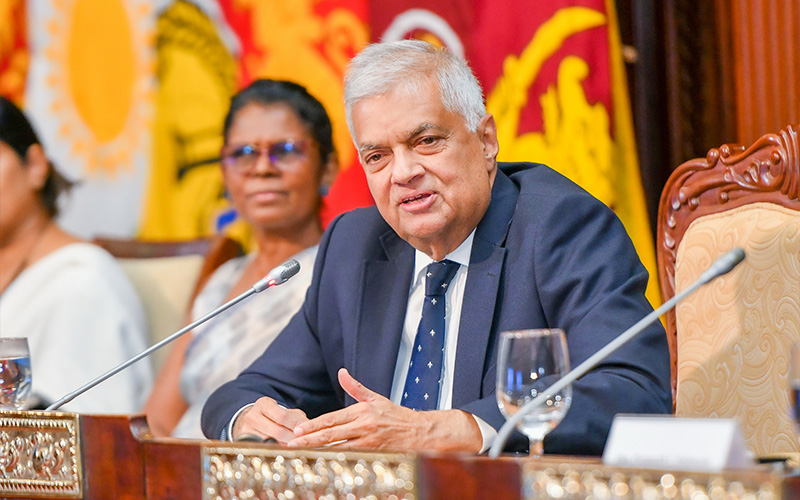
By Shamindra Ferdinando
Attempts had been made to compel UNP leader Ranil Wickremesinghe to give up the premiership immediately after the then President Gotabaya Rajapaksa had left Janadhipathi Mandiraya in the early afternoon of July 09, 2022.
That had been the devious Aragalaya strategy meant to pave the way for Speaker Mahinda Yapa Abeywardena to assume executive powers as a mere figurehead and with them easily controlling him with the threat of further upheaval. Obviously Aragalaya strategists wanted to force Wickremesinghe out of office before President Gotabaya Rajapaksa quit the presidency.
However, they may not have expected President Gotabaya Rajapaksa to flee President’s House immediately after protestors breached its main gates.
As we recall the law enforcers simply did nothing to halt the advance of the mob right into the President’s House, as people like US Ambassador Julie Chung openly prevailed on law enforcers not to act against what she repeatedly termed “peaceful protesters”, even after they, in a preplanned operation, meticulously burnt down more than hundred properties of government politicos and loyalists, across the country, on May 09/10, 2022. So they were on the whole the proverbial wolves in sheep’s clothing working with the Western regime change project here as was previously done in places like Libya and Iraq.
President Wickremesinghe discussed the challenge faced by him at the time of the Aragalaya, when he addressed a group of young legal professionals at the Presidential Secretariat on May 28.
Among those who had been at the head table was Colombo District SLPP lawmaker Premanath C. Dolawatte, an Attorney-at-Law and now widely believed to be one of those pursuing the UNP leader’s agenda.
Stressing the importance of the executive presidency in restoring stability, President Wickremesinghe recalled the situation as Aragalaya forced Gotabaya Rajapaksa out of Janadhipathi Mandiraya. The President said that some persons had asked him to resign as President Gotabaya Rajapaksa was on board a ship and on his way to Trincomalee.
The President’s Media Division (PMD) quoted him as having told the young professionals how he declined to resign unless an MP, who commanded the confidence of the majority in Parliament, emerged against the backdrop of chaos. The President said that even if he wrote a letter of resignation, he couldn’t have handed it over to President Gotabaya Rajapaksa when he was on his way to Trincomalee in a ship or flying to the Maldives to escape mob justice.
The President said that if he resigned, due to pressure brought on him by a particular person, or due to the destruction of his residence, at the top of 05th Lane, in Colombo 07, near Royal Primary, also on July 09, 2022, someone would have secured power outside the democratic process.
The President’s comments on Aragalaya didn’t attract sufficient media attention. In fact, the coverage of the Presidential Secretariat event had been influenced by the PMD media release. Both print and electronic media focused on the President pointing out that none of those contesting the forthcoming Presidential poll had assured so far that executive powers would be done away with.
Actually, at the 2019 Presidential election, SLPP candidate Gotabaya Rajapaksa never referred to the abolition of the Executive Presidency or further dilution of executive powers. The wartime Defence Secretary aspired to be an all-powerful Executive President and, in fact, further enhanced the presidency with the enactment of the 20th Amendment, enacted in late October 2020. The move to introduce a new Constitution was also meant to further enhance the Executive Presidency. That report, prepared at a tremendous cost to the taxpayer, is gathering dust, probably at the Presidential Secretariat. Perhaps Gotabaya Rajapaksa should inquire from his successor Ranil Wickremesinghe what he intended to do with it. The former President has every right to seek an explanation, not only from the President, but the Cabinet-of-Ministers as well.
Let us get back to President Wickremesinghe’s disclosure of the bid to force him out of office soon after President Gotabaya Rajapaksa boarded SLNS Gajabahu (formerly Sherman of the US Coast Guard), at the Colombo harbor, to escape the pursuing mob.
Now that President Wickremesinghe again made reference to Aragalaya’s bid to get rid of him, who could have asked Premier Wickremesinghe to resign on July 09, 2022? Had there been similar demands/requests in the run-up to Wickremesinghe receiving the appointment as President on July 14?
Perhaps, President Wickremesinghe would never reveal the identities of those who demanded his resignation, obviously on more than one occasion during July 09-14 period.
Political party system in a bind
Post-Aragalaya political leadership conveniently refrained from inquiring into the overthrowing of President Gotabaya Rajapaksa. Nearly two years after Gotabaya Rajapaksa’s ouster, there hadn’t been an effort, at any level, to conduct a thorough investigation into Aragalaya.
No holds barred investigation into Aragalaya shouldn’t be mixed up with individual cases, such as the killing of SLPP lawmaker Amatakeerthi Atukorale and his police bodyguard, at Nittambuwa, on the afternoon of May 09, 2022, or the killing of a protester at Rambukkana on April 19, 2022. A proper probe into Aragalaya should focus on the circumstances leading to the eruption of violent protest campaign, outside President Gotabaya Rajapaksa’s private residence at Pangiriwatte, Mirihana, on the night of March 31, 2022, and the period till President Wickremesinghe deployed the military and the police, including the Special Task Force (STF), on July 22, 2022, to clear the Presidential Secretariat of protesters. And all those who were threatening to die for the “system change,” they were ostensibly clamouring for, simply vanished into thin air. How convenient! And how conveniently Julie Chung’s trap, too, shut on behalf of Aragalaya?
Had Wickremesinghe lacked the courage to do so, regardless of “international “condemnation”, the Aragalaya could have been still in control of the President’s House, Presidential Secretariat, etc. Wickremesinghe acted swiftly and decisively as he realized the danger in failing to bring back the situation under control, within a short period of time. Or was that all a show to hoodwink the country? May be he knew too much about JVP shenanigans, especially with the West for them being the principal mover of the demand for system change, too, to go silent, like obedient kittens, with Ranil at the helm.
National Freedom Front (NFF) leader Wimal Weerawansa, MP, in April 2023, named outgoing US Ambassador Julie Chung as one of the key Aragalaya conspirators. The former JVP heavyweight went to the extent of alleging that Ambassador Chung personally met Speaker Abeywardena at the latter’s official residence in the wake of President Gotabaya Rajapaksa fleeing Janadhipathi Mandiraya.
Speaker Abeywardena never denied Weerawansa’s claim, though Ambassador Chung dismissed the allegation. However, President Wickremesinghe latest disclosure should be examined, taking into Speaker’s declaration in March this year that those who spearheaded Aragalaya even threatened him unless he cooperated with them. Speaker Abeywardena declared that Aragalaya wanted him to accept the presidency, though the Constitution stipulated that the Premier should succeed the President.
Then, obviously, those who demanded Wickremesinghe to resign, and Speaker Abeywardena to accept the Presidency in July 2020, must be the same. There cannot be any dispute whatsoever regarding the Aragalaya strategy. Obviously, ousted President Gotabaya Rajapaksa, in his widely read book ‘The Conspiracy to Oust Me from Presidency’ failed to properly deal with external intervention, particularly the interventions made by Ambassador Chung.
The US, through Ambassador Chung’s interventions, ensured protection for Aragalaya throughout the high profile project as President Gotabaya Rajapaksa’s control rapidly eroded. The then government never really comprehended the grave implications of the April 19, 2022 Rambukkana incident. The senior police officer in charge of Kegalle, Senior Superintendent of Police K.B. Keerthiratne, had to undergo the humiliation of being arrested and remanded over a police shooting that claimed the life of a protester. Had Keerthiratne failed to order that shooting, the protesters would have set ablaze a fully loaded bowser, carrying petrol, strategically placed across the rail tracks there to create chaos and disrupt rail transport By the time the SSP and three other policemen received bail, in August, Wickremesinghe was the President.
The former President should have dealt with the Rambukkana issue in his memoirs. There cannot be any doubt, or dispute, that the utterly irresponsible government response to police firing at Rambukkana discouraged the military from taking tangible measures to thwart the overrunning of Janadhipathi Mandiraya.
The Aragalaya opened Janadhipathi Mandiraya and Presidential Secretariat for the public and they remained in their hands until President Wickremesinghe regained control on July 22, 2022.
Prez draws sharp criticism
Sri Lanka couldn’t have continued with chaos caused in the wake of the political-economic-social crisis that threatened the ruination of the war-winning country that also successfully undertook so many development projects, like building expressways in the country for the first time, badly needed new international airport and even an international harbour, that became the envy of even our giant neighbour. Speaker Abeywardena, whatever his shortcomings and failures, should receive the respect and gratitude of all for saving the country from a horrible fate. Sri Lanka’s unitary status had been at stake and the country faced the risk of disintegrating.
Having been elected as the 8th Executive President on July 20, 2022 by the SLPP parliamentarians, who had the majority in the House, the UNP leader moved swiftly to regain control. Since then, Wickremesinghe, in spite of being reduced to just one National List MP in Parliament, never looked back as he advanced his agenda.
The President’s decision to do away with the Galle Face protest site earned the wrath of those who hoped for a different outcome. They expected Speaker Abeywardena, as Head of State, at least for a brief period, pending post-Gaddafi-style Libyan administration.
The following are some of the statements issued by the “usual suspects” who blindly tow the US line, in the wake of President Wickremesinghe’s directive:
UN Human Rights Commission:
“We are alarmed by the unnecessary use of force by security forces to break up a protest camp near presidential offices in Colombo. We condemn reports of beatings of protesters, journalists and lawyers and urge authorities to halt the use of force.”
The UNHRC Sri Lanka Core Group (consisting of Canada, Germany, Malawi, Montenegro, North Macedonia, the USA and the UK):
“peaceful protest is fundamental to any democracy and dismayed at the violence which took place at Galle Face on Friday.” The grouping called for full respect for human rights and the rule of law.
Amnesty International South Asia:
“…the attack on ‘GotaGoGama,’ the peaceful protest site in Colombo by the police and the military is unacceptable and authorities must stand down immediately. The right to protest must be protected. Sri Lankan authorities must immediately cease these acts of violence and release those arrested unlawfully in this manner. Authorities must also protect the freedom of the press. Journalists must not be barred from ‘GotaGoGama’. Blocking journalists from doing their jobs directly violates freedom of the press.”
Human Rights Watch South Asia Director Meenakshi Ganguly said:
“President Ranil Wickremesinghe has been telling donors and friends that he is committed to resolving the economic crisis, and yet among his first acts was to deploy a midnight security forces raid to disperse the peaceful protesters. The international community needs to act now, send a strong message that the global efforts are directed to support the people of Sri Lanka, and not to prop up abusive political leaders who undermine fundamental freedoms.”
UN Resident Coordinator Hanaa Singer-Hamdy said she was gravely concerned by the use of force to disperse protesters.
“Journalists and human rights defenders have a right to monitor demonstrations and their functions should not be impeded. Actions that stifle protests and right to peaceful assembly can worsen economic and political stability in Sri Lanka. Peaceful solutions in accordance with broad public consultations is the only way forward.”
The European Union:
“Freedom of expression proved essential to Sri Lanka’s current transition. Hard to see how severely restricting it can help in finding solutions to the current political and economic crises.”
UK High Commissioner Sarah Hulton expressed concern over the attack and said:
“We have made clear the importance of the right to peaceful protest.”
US Ambassador Julie Chung:
“Deeply concerned about actions taken against protestors at Galle Face in the middle of the night. We urge restraint by authorities and immediate access to medical attention for those injured.”
Canadian High Commissioner David McKinnon:
“It is crucial the authorities act with restraint and avoid violence.”
The Presidential Secretariat remained in the hands of protesters till midnight July 22, 2022, out of the three State properties they took control of on July 09. Protesters evacuated from the other two – the President’s House and Temple Trees ahead of any confrontation with the military tasked to remove them!
In the absence of proper investigations…
Chief Government Whip Prasanna Ranatunga is one of the few lawmakers to question the failure on the part of relevant authorities to investigate organized attacks on government MPs. When the writer raised this issue with Minister Ranatunga a few moons ago, the Gampaha District SLPP strongman expressed serious disappointment over the status of the investigations.
Declaring that his properties at Udugampola, Gampaha, had been set ablaze in the presence of law enforcement officers, Urban Development and Housing Minister Ranatunga said that he was still awaiting the conclusion of the investigation undertaken by the Human Rights Commission. None of those who had been identified as responsible for systematic destruction of houses and other properties belonging to government members and in some cases supporters hadn’t been dealt with.
President Wickremesinghe’s recent disclosure of efforts to force him out of the Premier’s Office revealed that there hadn’t been a proper investigation into the Aragalaya at all. What is the mysterious evil hand preventing justice being done to victims of mob justice by Aragalaya? But the evil West leaves no stone unturned in seeking “justice” on behalf of the LTTE and its sympathisers, who tried to break up this country through sheer raw terror.
It would be interesting to know the status of the investigation promised by the Attorney General Sanjay Rajaratnam, PC, into the May 9/10 attacks on politicians’ properties. A case filed by a group of politicians, demanding an investigation into these incidents, had been withdrawn in late May, 2023 on an assurance given by the Attorney General.
The State Counsel appearing on behalf of the Attorney General assured Court that the AG had received an assurance from the Public Security Ministry that there would be a formal investigation into the incidents and secondly, the Secretary to the President promised that the Wasantha Karannagoda Committee report on the May 2022 incidents would be brought to the attention of the President.
What is the status of the promised investigation? President Wickremesinghe cannot absolve himself of the responsibility for ensuring a comprehensive investigation into violence perpetrated during 2022.
In spite of allegations that the JVP instigated an attack on Samagi Jana Balawegaya (SJB) and Opposition Leader Sajith Premadasa at the Galle Face protest site on the afternoon of May 09, 2022, the main Opposition party never pushed hard for an investigation.
Recently MP Premadasa confirmed the alleged JVP plot when the writer sought his response to SLPP MP Johnston Fernando’s declaration that Premadasa would have been lynched if his driver failed to reverse the vehicle at high-speed after the JVP mob surrounded Premadasa. Sunil Handunetti declared that both Johnston and Sajith should have their heads examined. But JVP Leader Anura Kumara Dissanayake was virtually received with open arms by the same Aragalaya activists on the same day at the same venue
Another matter for serious concern is that all suspects arrested in connection with the killing of MP Amarakeerthi Atukorale were granted bail without the AG being consulted. The accusation has been made by the AG in respect of the decision taken by the Trial-at-Bar of the Gampaha High Court. We would refrain from commenting on the issue at hand as the matter is pending before the court.
The Wickremesinghe-Rajapaksa government has completely ignored ex-President’s allegations that the military deliberately failed to thwart the public protest campaign that was launched on March 31, 2022. Gotabaya Rajapaksa went to the extent of alleging that Chief of Defence Staff (CDS) General (retd.) Shavendra Silva and Defence Secretary General (retd.) Kamal Gunaratne may have failed to take tangible measures as they were under pressure due to war crimes accusations directed at them by the US. However, it must be pointed out that General Silva hadn’t been at the helm of the Army at the time Aragalaya overran Janadhipathi Mandiraya with ease.
President Gotabaya Rajapaksa replaced General Silva on June 1, 2022, following the May 09 incidents which shook his government with Vikum Liyanage, also of the Gajaba Regiment as the Commander of the Army, though various interested parties found fault with Silva, who headed the celebrated 58 Division that in way spearheaded the war victory, for not protecting Gotabaya Rajapaksa’s government.
The UNP also provided muscle to Aragalaya. Former MP and current presidential advisor Ashu Marasinghe and SJB MP and Minister Harin Fernando had declared the UNP’s direct role in Aragalaya whereas the JVP and its breakaway faction the Frontline Socialist Party (FSP/Peratugami Pakshaya) played a significant role. However, the vast majority of those who provided the real strength to the protest campaign were not members of any political party but angry Sri Lankans influenced by the collapsing of the economy. They also engaged in looting in some instances but there were organized groups which caused massive destruction, systematically at the behest of Aragalaya masterminds operating from behind the scene.
President Wickremesinghe should name those who had asked him to give up the premiership. Speaker Abeywardena, too, should reveal who threatened to harm him unless he fully cooperated with the Aragalaya.
Midweek Review
High Ground Visitors

By Lynn Ockersz
White-clad and smug,
In cavernous Limousines,
The dignitaries are back,
Trying out winning smiles,
Surveying the debacle,
Of these brave decades,
Of people and homesteads,
Sinking mercilessly,
In backwaters of neglect,
Which is the best proof yet,
That the land’s periphery,
Has not figured much,
On the planning boards,
Of those ‘strutting and fretting,
Their hour’ on high ground.
Midweek Review
Formation of TNA, post-war politics and Sumanthiran’s role
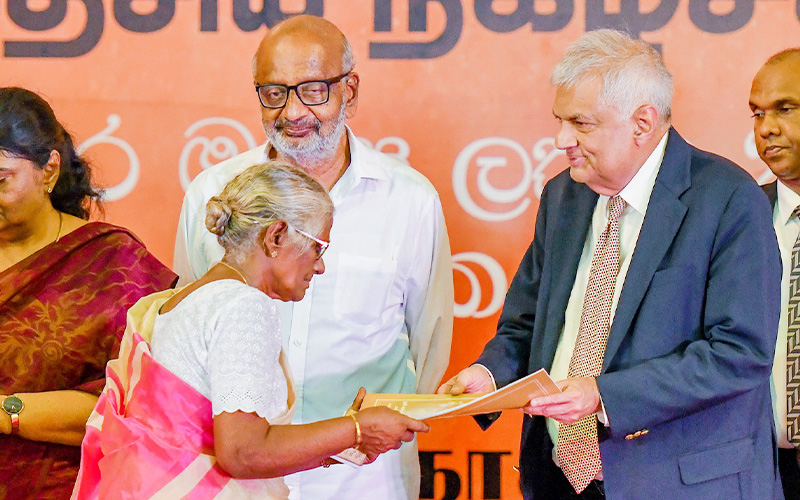
By Shamindra Ferdinando
Jaffna district parliamentarian Mathiaparanan Abraham Sumanthiran’s recent declaration supportive of the militarily defeated Liberation Tigers of Tamil Eelam (LTTE) particularly captured the public attention.
Then soon after, MP Sumanthiran surprised all by appearing on stage with President Ranil Wickremesinghe, in Jaffna, where the UNP leader bestowed land deeds on a selected group of people.
With them on stage were EPDP leader Douglas Devananda, MP, and Dharmalingam Siddharthan, MP, of PLOTE/TNA whose father, Visvanather Dharmalingam, MP (Jaffna District) was assassinated by TELO at the behest of Research and Analysis Wing (RAW) in Sept 1985. (Siddharthan himself told the writer that his father and colleague Jaffna District MP Arumugam Murugesu Alalasundaram were abducted and killed in a Mafia-style TELO operation). Will deal with Sumanthiran’s Jaffna move later.
Issuing a statement ahead of Tamil Genocide Remembrance Day that was marked on May 18 around the world, Sumanthiran, PC, now in his third term as a lawmaker, said: “Although it is my personal belief that a just political liberation cannot be achieved at the point of a gun, I have repeatedly stated that we cannot today decry or judge the decision taken by the Tamil youth who saw no other option at a time when oppression and military….”
The Illankai Arasu Katchi (ITAK) MP went on to say: “I have also consistently emphasized that the commitment and sacrifices unselfishly made by those who took up arms on our behalf should be regarded very highly.”
Sumanthiran tweeted hours before he paid respects to those who perished in fighting and the civilians at the Mullivaikkal commemoration site. However, Sumanthiran attended another commemoration also on the same day organized at the Viharamahadevi Park by several groups, including the Global Tamil Forum (GTF), to remember “all victims of war over 30 years in the North and South.”
Some found fault with MP Sumanthiran for attending the Colombo event where organizers quite rightly refrained from making reference to any particular group or community. There hadn’t been a similar remembrance event in Colombo since the end of the war 15 years ago. The same group organized an inter-religious prayer event at the Vavuniya Town Hall grounds, also on the same day.
The GTF should be commended for taking a courageous stand in spite of criticism by those who still seek advantage of the LTTE’s crushing defeat.
Perhaps, the GTF-led group should have made reference to Sri Lankans killed overseas due to terrorism, Indian military deaths here (July 1987-March 1990) and former Indian Premier Rajiv Gandhi’s assassination in May 1991 while campaigning during a general election by a brainwashed LTTE teenage suicide cadre.
The Tamil community shouldn’t confine the war dead commemoration to those who died during the last phase of the fighting with the focus on Mullivaikkal. Commemorations whether in the North, East or Colombo should be devoid of any petty racial connotation, for all were human beings. Such events shouldn’t be allowed to cause further divisions among the communities, under any circumstances. Those who make unnecessary interventions with a view to attracting media attention should be appropriately dealt with by law enforcement authorities.
We also like to ask self-proclaimed international do-gooders why they don’t show even an iota of interest in the unimaginable suffering undergoing by Palestinians at the hands of the Israelis, while they make a song and dance about imaginary genocide they claim to have happened here during the last phase of fighting.
The ITAK is the main constituent of the Tamil National Alliance (TNA) that had been formed in late Oct 2001 in line with the community’s overall politico-military strategy to achieve Eelam. Against the backdrop of the worst-ever battlefield defeat that had been inflicted on the Army in April 2000, Eelam seemed achievable. Having defeated the 54 Division, deployed at the Elephant Pass sector then widely believed to be impregnable, thereafter the LTTE almost succeeded in overwhelming the Army in the rest of the peninsula.
Muslims’ dilemma
The Sinhalese and Tamils should also publicly repent the suffering experienced by the Muslim community. That community suffered untold hardships for being steadfastly taking a stand against separatism. Had they thrown their weight behind the LTTE, the country could have been overwhelmed and the 2009 absolute victory over the LTTE couldn’t have been achieved. So, do not hesitate to recognize the Muslims’ commitment as a whole to Sri Lanka’s unitary status. They paid a very heavy price for being always supportive of the government stand for a united Sri Lanka, whoever was in power.
The 2019 Easter Sunday massacre, carried out by a group of extremist misguided Muslims, shouldn’t in any way be used against the community. Officers and men of the Muslim and Tamil communities served in the armed forces and police with distinction and made quite a contribution to the overall success of the war.
Just five months after the LTTE resumed war in June 1990 in the wake of the IPKF withdrawal from the temporarily-merged North and East Provinces, the LTTE ordered the Muslims out of the Northern region, comprising Jaffna, Kilinochchi, Mannar, Mullaithivu and Vavuniya giving them a matter of hours to leave. The then President Ranasinghe Premadasa’s government couldn’t do anything about it. The international community turned a blind eye. Tamil politicians remained silent. No one dared to challenge the LTTE’s inhumane and drastic move.
Twenty-one years later a deranged Norwegian Andres Breivik massacred 77 persons, mostly children in two attacks the attacker claimed was influenced by the LTTE’s eviction of the Muslim community from Northern Sri Lanka.
Did the late LTTE theoretician and ideologue Anton Balasingham approve of Velupillai Prabhakaran’s plan to force Muslims out of the Northern Province? Balasingham, the one-time British High Commission employee in Colombo, passed away in the UK, in Dec 2006, of kidney failure, a couple of months before the LTTE lost control of the Eastern Province.
Far right Breivik, then 32, a few hours before he went on the rampage on July 22, 2011, made reference to the LTTE’s eviction of the Muslim community from the Northern Province, in his so-called manifesto posted online. The following are the references (1) Pro-Sri Lanka (supports the deportation of all Muslims from Sri Lanka) (Page 1235) and (2) Fourth Generation War is normally characterized by a ‘stateless’ entity fighting a state or regime (the EUSSR). Fighting can be physical such as the Liberation Tigers of Tamil Eelam (LTTE) to use a modern example. (Page 1479).
Perhaps, Sri Lanka should have asked those who had been demanding international inquiry to include the Norwegian massacre in their agenda. One of Sri Lanka’s foremost diplomats, the late Jayantha Dhanapala, appearing before the Lessons Learnt and Reconciliation Commission (LLRC) in 2010, stressed on the need for accountability on the part of foreign governments. The then Mahinda Rajapaksa government, probably blinded by unfathomable victory, was not bothered. It only saw immediate political advantage out of the developments even forgetting the long term ramifications for the country.
Focus on Sumanthiran
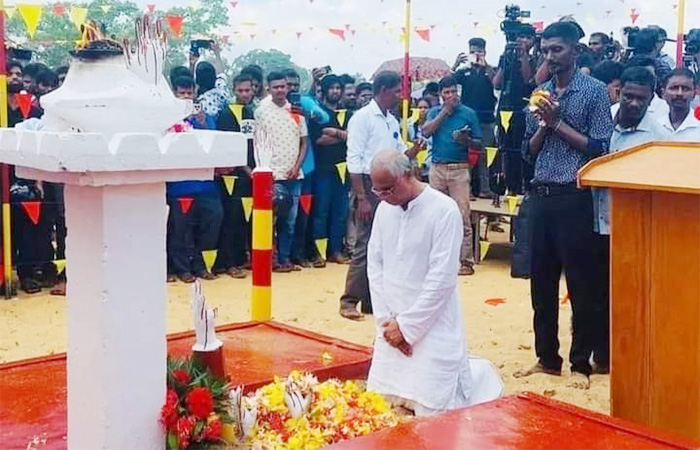
Sumanthiran on his knees before the Mullaivaikkal monument
(pic courtesy Tamil Guardian)
Maybe MP Sumanthiran should have recognized the LTTE as the group that continued the war until the very end. The parliamentarian shouldn’t have hesitated to do so though terrorism cannot be justified under any circumstances. The LTTE, however, proved its conventional capabilities throughout the war. The casualties, and the losses the group inflicted on the Indian Army underscored its fighting capabilities.
As Sumanthiran entered Parliament at the 2010 General Election, perhaps he hadn’t been affected by the LTTE’s wartime strategies and unprecedented developments that characterized the conflict, with him comfortably settled down in Wellawatte.
The writer first met Sumanthiran at A.J.M. Muzammil’s (incumbent Governor of the Uva Province) residence at No 07, Alfred House Road, Colombo 03 in June 2011. Muzammil, who had been a UNP member of the Western Provincial Council (WPC), arranged the writer to interview former Tamil Nadu State Assembly Congress I member Hasanali Kuddus at his residence. The new entrant to the Parliament Attorney-at-Law Sumanthiran, too, was there on that occasion and the writer had an opportunity to seek his opinion on some contentious matters.
Naturally, matters raised herein included the recognition of the LTTE by the TNA as the sole representative of the Tamil speaking people ahead of the signing of the Ceasefire Agreement (Feb 2002), LTTE-TNA joint boycott of 2005 presidential poll that cost UNP leader Ranil Wickremesinghe victory (the writer wouldn’t humiliate the defunct LTTE by repeating allegation that the Rajapaksas bribed the LTTE to order the boycott. The LTTE may have accepted money but the boycott was not certainly inspired by that) and still unbelievable was the TNA backing for the war-winning Army Chief Gen. Sarath Fonseka at the 2010 Presidential Poll. The TNA ensured a comfortable victory for Fonseka in the entire then merged North-East Province though he lost badly in the rest of the country. Mahinda Rajapaksa secured a second term by obtaining 1.8 mn votes more than Fonseka. A silly claim of computer “jilmaart” by Fonseka’s camp made his defeat even worse.
Kuddus, in an exclusive interview with The Island, strongly defended the eradication of the LTTE though concerns remained of atrocities allegedly committed by the military. Declaring that Sri Lanka couldn’t be punished on the basis of unsubstantiated war crimes allegations, Kuddus said that no country would be safe if legitimate governments were deprived of the opportunity to neutralize threats posed by terrorism. If Sri Lanka could be questioned over its right to hit back hard at the LTTE, what would be the position of the Indian military battling those who had taken up arms? (Congress I member Hasanali speaks out, The Island, June 16, 2011 edition)
At the April 2010 General Glection, the Tamil National Alliance (TNA) won 14 seats. Thirteen were elected while the party secured just one of the 29 National List slots. The TNA picked Sumanthiran as its NL member. It would be pertinent to mention that the TNA was placed third in terms of the number of seats won at that election. The UPFA secured a staggering 144 seats, including 17 NL slots whereas the UNP-led United National Front obtained 60 seats. Nine NL MPs were among them.
The TNA tally drastically dropped due to the eradication of the LTTE. At the previous general election conducted in April 2004, close on the heels of the devastating split in the group, the TNA won a record 22 seats, including two NL slots. The European Union Election Observation Mission, in its report found fault with the TNA for being the beneficiary of poll violence unleashed by the Tigers to stuff ballot boxes in TNA’s favour. That was the best outcome for the TNA at a general election.
At the last General Election, the TNA tally was reduced to 10 MPs. It is a pity that Sumanthiran couldn’t gain the leadership of the ITAK at a keenly contested election in January this year. Jaffna District lawmaker Sivagnanam Sritharan secured 184 votes while M.A. Sumanthiran obtained 137 votes.
Let us get back to MP Sumanthiran’s appearance on stage in Jaffna with President Wickremesinghe last week. During his brief statement, the President’s Counsel made reference to the LTTE-TNA boycott of the 2005 Presidential Poll that caused Wickremesinghe’s defeat, Mahinda Rajapaksa’s election and the unthinkable annihilation of the LTTE. The Presidential Media Division (PMD) quoted Sumanthiran as having told the gathering: “It is possible that the challenges in the North may have impeded your journey in 2005, a fact that I believe is now regretfully acknowledged by the people of the region.”
In the wake of a minor commotion over MP Sumanthiran’s appearance on stage with Wickremesinghe, the PC tweeted that his attendance at the state functions in his electorate shouldn’t be considered as an endorsement of the UNP leader’s candidature at the forthcoming Presidential Poll. The Jaffna District MP’s tweet is irrelevant. His declaration pertaining to the 2005 Presidential Poll clearly meant his support for Wickremesinghe.
The bottom line is that if not for that strategic mistake made by the LTTE and TNA in 2005, they could have achieved military superiority in the North after the then expected UNP victory as Wickremesinghe hardly making even a whimper against the LTTE. MP Sumanthiran’s politically charged statement in Jaffna should be examined also taking into consideration two key developments-in April 2003 (LTTE quit negotiating table) and January 2010 (backed General Fonseka).
The TNA could have used the opportunity to reach a consensus with President Rajapaksa if the party at least adopted a neutral stance. Instead, the TNA joined with the UNP and the JVP to defeat President Rajapaksa, thereby causing a lot of hostility. Backing Fonseka also dealt a severe blow to the TNA’s credibility in the backdrop of war crimes accusations directed at the Army.
GR meets Sampanthan at India House
Sumanthiran cannot be unaware of an attempt made by India in 2011 to work out an arrangement between President Rajapaksa’s government and the TNA.
TNA leader R. Sampanthan has been keen to normalize relations between his party and the government. The veteran politician appeared to have felt that such an arrangement could have helped his community and sought Indian intervention. But a section of the party sabotaged that effort, thereby undermining reconciliatory moves.
Following an incident at Alaveddi that had been staged by the group opposed to Sampanthan’s bid, an angry Defence Secretary Gotabaya Rajapaksa told the writer of a hitherto unreported meeting between him and Sampanthan at India House on June 08, 2011. The meeting that had taken place in the presence of the then Indian High Commissioner Ashok Kantha could have facilitated post-war reconciliation.
Pointing out that the June 16 incident at Alaveddi was meant to harm reconciliatory moves, Gotabaya Rajapaksa said that unwarranted interventions made by various interested parties, including the US, caused complications (GR alleges TNA split over Sampanthan’s reconciliation move with strapline ‘TNA pressured US State Department, several diplomatic missions to take up Alaveddi issue’ in the June 20, 2011 edition of The Island.
Recently SJB MP Mano Ganesan attacked TNA over what he called its post-war honeymoon with the government. A comprehensive post-war examination of political developments, commencing with the formation of the TNA at the behest of the LTTE, is necessary to comprehend the situation today.
The arrest of four persons in February 2017 during the Yahapalana administration, over an alleged attempt on Sumanthiran’s life, underscores the need for a wider examination of developments. The suspects held under Prevention of Terrorism Act (PTA) were granted bail in Oct 2022.
During that administration, the TNA played quite an important role with Sampanthan receiving the Opposition Leader’s post though his party had only 16 seats, including two NL slots whereas the breakaway UPFA faction comprised over 50 MPs. But, Yahapalana bosses decided in favour of TNA. In return, the TNA helped thwart President Maithripala Sirisena’s bid to form a new government under the premiership of Mahinda Rajapaksa. Formed in late Oct 2018, the Sirisena-Rajapaksa effort collapsed in 52 days. Sumanthiran played a significant role in the counter attack in support of ousted Wickremesinghe, who continued to insist he was the Premier regardless of the appointment made by Sirisena. Finally, the SC ruled in favour of Wickremesinghe. The rest is history. However, in the wake of 2019 Easter Sunday carnage, MP Sumanthiran said something which he shouldn’t have said under any circumstances. Addressing the first anniversary event of the political weekly ‘Annidha’ on April 29, 2019 at the BMICH, the TNA spokesman justified the heinous crime. He warned of dire consequences unless the government addressed the grievances of the minorities.
Sumanthiran is best remembered for his role in working out a tripartite agreement on a hybrid war crimes court as announced in Washington in June 2016.
Political parties need to make a genuine effort to move forward. The post-war reconciliation wouldn’t be realistic until parties represented in Parliament stopped playing politics with the war. The Tamil community should accept the LTTE had ample opportunities to reach consensus with the Sinhala leadership, particularly Ranil Wickremesinghe, who pursued a strategy even at the expense of his political life. The LTTE’s cardinal sin or serious error of judgment was the April 2003 withdrawal from the Norway-led peace effort. That was meant to create an environment conducive for full scale war that the group felt could have been brought to a successful conclusion by it. The LTTE was certainly ready for war in August 2005. If not, Prabhakaran wouldn’t have ordered Foreign Minister Lakshman Kadirgamar’s assassination. Full scale war commenced exactly a year later and what was widely believed to be an invincible force collapsed within two years and 10 months. Had the military not taken the civilian factor into consideration, the LTTE could have been wiped out much earlier. The ICRC said so as revealed by WikiLeaks.


